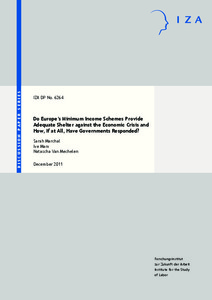Du Europe's minimum income schemes provide adequate shelter against the economic crisis and how, if at all, have governments responded?
"The present economic crisis comes against the background of decades of policy changes that have generally weakened the capacity of social safety nets to offer citizens with adequate resources for financial survival when labour markets fail to do so. Building on data for 24 European Union count...
| Main Authors: | , , |
|---|---|
| Institution: | ETUI-European Trade Union Institute |
| Format: | TEXT |
| Language: | English |
| Published: |
Bonn
2012
IZA |
| Subjects: | |
| Online Access: | https://www.labourline.org/KENTIKA-19135770124919539529-Du-europe-s-minimum-income-sch.htm |
| Summary: | "The present economic crisis comes against the background of decades of policy changes that have generally weakened the capacity of social safety nets to offer citizens with adequate resources for financial survival when labour markets fail to do so. Building on data for 24 European Union countries, this paper asks whether EU governments implemented additional measures during the first phase of the crisis to improve safety nets. Our data, drawn from a large network of national experts, show that many countries introduced supportive measures, in particular in the form of additional increases in gross minimum income benefits. More generous child benefits have also helped to increase net disposable incomes of families on minimum income. Behavioral requirements imposed on minimum income recipients have been neither tightened nor relaxed. In a limited number of countries, activation efforts aimed at minimum income recipients have been intensified. Despite some improvements, social safety nets in Europe remain far below widely accepted poverty thresholds, including the EU's own official measure." |
|---|---|
| Physical Description: | 23 p. Digital |

